The privately owned AM100 dealer group has grown steadily and profitably, and marked its 10th anniversary this year by issuing shares in the business to its workforce. For several years, it has donated 10% of its profits to the Peter Vardy Foundation, which supports good causes locally.
It puts great emphasis on working hard, working cleverly, so that everyone can reap the rewards – it’s not all for the benefit of the Vardy family.
Chief executive Peter Vardy said: “The ethos is trying to be more like a family business, because we’ve got the ability to do that, not being a PLC and the size that we are. We try to make sure people don’t take kindness for softness. But you’ve got genuine interest in doing the right thing by the people that work for you.
Car dealers are forever being told that tech-savvy millennials are taking over the world. Well, Peter Vardy’s workforce has an average age of 36 and is innovating fast, but world domination is not its aim. The ambition? To build a world-class business.
The privately owned AM100 dealer group has grown steadily and profitably, and marked its 10th anniversary this year by issuing shares in the business to its workforce. For several years, it has donated 10% of its profits to the Peter Vardy Foundation, which supports good causes locally.
It puts great emphasis on working hard, working cleverly, so that everyone can reap the rewards – it’s not all for the benefit of the Vardy family.
Chief executive Peter Vardy said: “The ethos is trying to be more like a family business, because we’ve got the ability to do that, not being a PLC and the size that we are. We try to make sure people don’t take kindness for softness. But you’ve got genuine interest in doing the right thing by the people that work for you.
“We don’t get out of bed every day to see how much money we can make. Obviously, it’s part of the business, but I think the primary reason to get out of bed in the morning is to run a world-class business.”
To that end, the group focuses on six objectives:
■ To be a best place to work
■ To be a best place to buy
■ To develop the best manufacturer relationships
■ To evolve its digital strategies
■ To give 10% of profits back to society
■ To achieve financial performance targets.
Managing director Cameron Wade said: “Only a sixth of what we do is about the straight financials, which is the right way to be. If you do the other five areas of the business incredibly well, your sixth one falls into place. We’ve shown that. You follow good processes all the time and put in place very good structures, then that will deliver the financial performance.”
Vardy carefully planned the structure of the business before he bought his first dealership just over 10 years ago. He’d worked in a variety of roles in Reg Vardy, which his father, Sir Peter Vardy, had built into one of the largest UK dealer groups until its sale to Pendragon in 2005. After the sale, that ambition to build a world-class business, and the mentoring of Sir Peter in a chairman role, enabled Vardy to launch his own business in his mid-20s and acquire a portfolio of dealerships.
The result 10 years on is a very flat structure, with lots of ambitious people in roles that play to their strengths. Vardy wants it that way – the staff at the dealerships are focused on selling and delighting the customer, and all the support functions they need are provided by Vardy Central, based at Queenslie, outside Glasgow, which houses teams covering the accounts, marketing, digital, stock management, HR and customer contact centre.
It has a retail approach and runs the business weekly, rather than monthly, inspired by Vardy’s visit to Asda’s headquarters many years ago. Every Monday, the heads of business and heads of department go through a set agenda with key duties and key issues. The result, he said, is that if something is wrong it can be often fixed within a week.
Vardy said: “I would say Reg Vardy was fast, but this is Usain Bolt in terms of how quick this goes. Partly because I don’t think we’ve got out of the start-up mentality, we’re only 10 years in. There was that ‘get away from zero as fast as you can’. You get out of loss as quick as you can, and so that pace has probably stayed with the company.”
The result is a business that sells 25,000 cars a year from 11 dealerships, all to retail and SME customers. In 2015, it recorded operating profit before amortisations and donations of £12.1m.
“Because of the web, the old model of how many cars the dealership can do goes out the window. So how do you maximise the investment you’ve got at each site? Ironically, it’s by spending more money centrally to allow the guys on site to focus on the customer and the selling. So we do significant volumes of cars in our dealerships. And they are not all physically big sites,” said Vardy.
The Vardy Central operation was renamed from Head Office, to get away from the notion that a head office is most important, and Vardy and Wade emphasise that every person in the group is a crucial link in a chain.
That recognition shows in the £5 million worth of family-owned equity shares granted to its 800 staff through The Peter Vardy Partnership scheme last summer, and in the Peter Vardy Foundation, which allocates 10% of annual profits to local causes supporting children, the homeless and victims of human trafficking.
Vardy said colleagues understand what the company is about, and engage in it more, plus it brings the benefit that the better people want to work at Peter Vardy.
“By making a partnership and by having the foundation, I think we are pretty much putting our money where our mouth is, in saying it’s not all about a return for the family. We can get a world-class organisation, we can get the best place to work, we can have customers think it’s the best place to buy, and then we can give the money out where people really are struggling.”
The partnership, he said, ensures that every pair of hands brings a free brain.
“One of the principles of the partnership scheme is that you ask every colleague, if it was their business, would they run it like this? Every single one of them.” Employee engagement tracks at 90%.
This year the focus was ‘passion for profit and war on waste’. In 2017, the partnership will focus on what to do or stop doing to influence the guest experience, including examining aftersales processes, and how to join a customer’s online experience with their showroom experience, helped by a new dealership management system, Drive, from CDK.
“So what we’re trying to do is empower all 800 of the partners. They own part of the business the same as I do, so they’ve got a right to vote. So with the right to vote I expect an opinion,” said Vardy.
“Only a sixth of what we do is about the straight financials, which is the right way to be”
Cameron Wade, managing director, Peter Vardy
The company operates a ‘three-showroom strategy’: digital showroom, physical showroom and database showroom. In practice, this means Vardy recognises each of the three requires different skill sets, different resources, and different processes. Under the digital showroom strategy, each dealership has staff responsible for digital leads who have received extra training in writing emails and text messages and using CitNow video devices, and every dealership has a turntable for photography and videography. In the physical strategy, the showroom teams in volume dealerships have vehicle handover specialists to free the salespeople to focus on the face-to-face selling.
“We have more resource per site than other people will, but again that’s because of the volume. By putting so much volume through, you can then divide all the tasks and get clear accountability,” said Vardy.
“The problem with a lot of businesses these days is people spend the biggest amount of their time on things that they are not good at. We’ve been restructuring businesses since the start really, not around what we’ve done, but what we thought was the most efficient. It’s that whole idea of playing to your strengths – if you can re-engineer your processes and your job roles, it’s brilliant for everybody.”
Vardy acknowledged that much of the focus has been on sales, and aftersales will come more under the management team’s scrutiny from 2017. The business needs to become more customer-centric, said Wade, and consider how it can better utilise its facilities and time to serve people who may not actually want to come into a business to get their car serviced, but are required to, at times the business dictates.
Vardy believes there will be no single answer, but the business will become more “malleable” to what the customer wants. The key things are being open-minded, interrogating data, trialling solutions and testing them quickly.
“By making a partnership and by having the foundation, I think we are pretty much putting our money where our mouth is, in saying it’s not all about a return for the family”
Peter Vardy, chief executive, Peter Vardy
Peter Vardy turned a profit within two years of its 2006 launch, and it has remained in the black since. Although annual profit before tax appears to be on a rollercoaster, Vardy has a robust explanation for it – its growth strategy.
In the past decade, the company has doubled in size every three years, buying businesses which can be improved. Unlike the national dealer groups, which are large enough to have turnaround teams to send into new businesses, the team Peter Vardy sends in to integrate the new businesses is built from those having success in the current business, so there is a drop-off in performance.
“If you look at the times when I’ve bought things you’ll see that it’s happened. When I’ve owned things for three years, you’ll see it’s very profitable, fourth year buy things, drop down again, builds back up again. The profit follows every four years,” said Vardy.
After a record year, and gearing at its lowest level since 2011 (it bought Jaguar, Land Rover and Porsche businesses in Aberdeen in 2012), Vardy is expecting to acquire again, and add a new volume brand to its portfolio. It’s a question of finding the right business with the right brand, he said.
There is no great rush, with plenty more to come from the current businesses and new start-ups. Its CarStore car supermarket division in Glasgow, which was forecast to sell 4,250-4,500 cars this year, is about to be replicated at Dundee, and a third unspecified location will follow. The company also launched CarMoney, an online finance broker, this year, and has other online ventures in the pipeline.
Asked how the consumer trend of doing more and more online marries up with carmakers’ continued demands for investment in physical facilities, Vardy conceded it is a problem – “a very scary topic”.
”There is a role for the physical dealership, but are there going to be less? It is an area of concern if you’re trying to grow your business at the moment. We are clearly putting a lot of money behind big used car supermarkets and digital businesses at the moment for that very reason. It is easily understood, because customers are using those channels. Whereas, with franchised dealerships, it’s a bit less transparent, so we’re going where the business is transparent – big used car supermarkets and digital businesses.”
Peter Vardy has invested £14m this year in new premises for Jaguar Land Rover and Porsche in Aberdeen. The company is confident in the returns – it’s the UK’s most successful territory for Land Rover, and the only Porsche outlet above Scotland’s central belt.
As a youthful, privately owned motor retailer, Peter Vardy is well positioned to take calculated risks.
“Business leaders need to have big, hairy, audacious goals. You need to have some fun and also some excitement and vision so people can be energised by what we are trying to do as a company. Some of the things we are trying to do at the minute, like CarStore, like Car Money, they are really to inspire, set a bit of a vision, and try new things,” said Vardy.
“I think if you’re always worrying about the bottom line, you don’t do things like that. If you’re trying for a world-class business, then you have to have a go. You know some of them might not work, but if you do enough work in the background and have the aspiration, then they do.
Ultimately, the board of Peter Vardy measures the group’s financial success by return on investment, not return on sales. “We will run as much as we possibly can through each individual dealership. Do 25,000 cars through 11 dealerships, forget the turnover figure, the key to the business is how much is put into it and how much is made.
“If we focus too much on the money, then best place to work and the best place to buy would go down the swanny, because I can make a lot more than I’m making today by taking a lot of things out, that I think currently improve guest experience. Say we earned £12 million out of 11 dealerships, but at the expense of best place to buy, why would I do that?”
Login to continue reading
Or register with AM-online to keep up to date with the latest UK automotive retail industry news and insight.

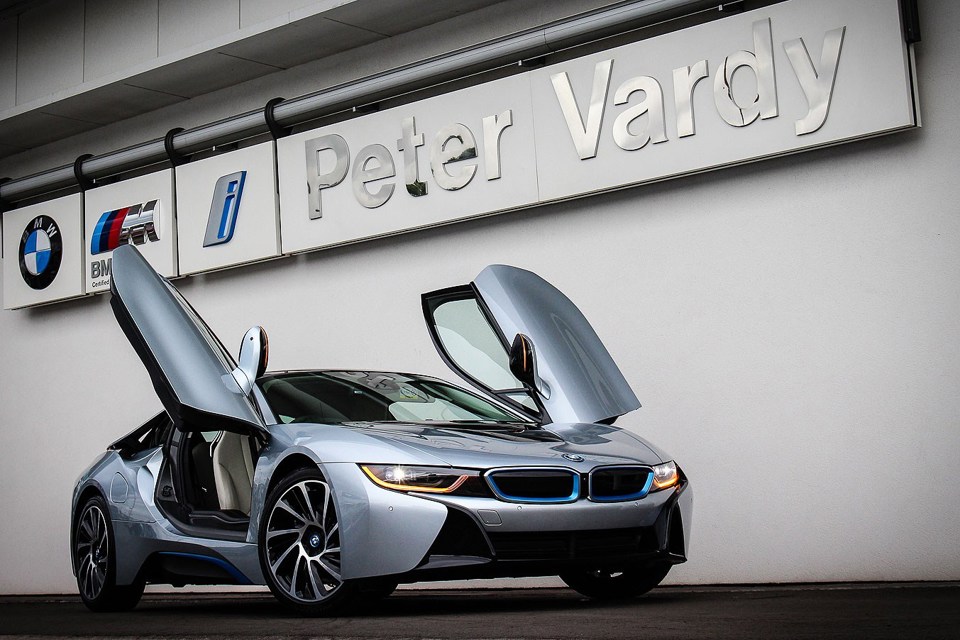



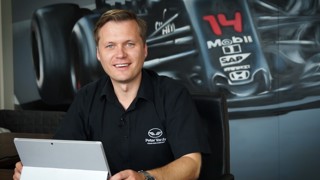
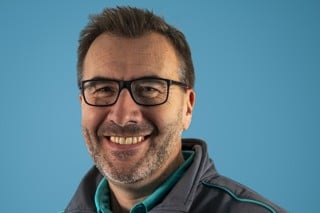
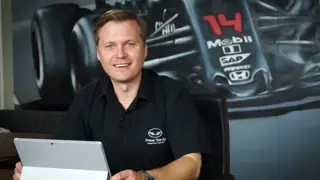
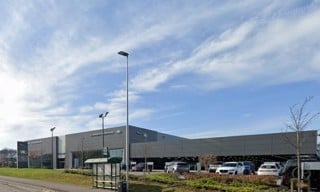














Colin Redman - 28/02/2017 11:10
Any relation to Jamie Vardy?